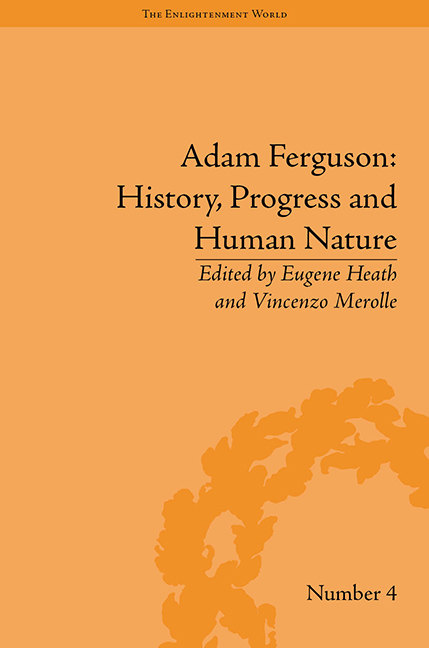Book contents
- Frontmatter
- CONTENTS
- Contributors
- Introduction
- I Life and Works
- II In History
- III On History
- 7 Ferguson, Roman History and the Threat of Military Government in Modern Europe
- 8 Ferguson's ‘Appropriate Stile’ in Combining History and Science: The History of Historiography Revisited
- IV Human Nature, Action and Progress
- Notes
- Works Cited
- Index
7 - Ferguson, Roman History and the Threat of Military Government in Modern Europe
from III - On History
- Frontmatter
- CONTENTS
- Contributors
- Introduction
- I Life and Works
- II In History
- III On History
- 7 Ferguson, Roman History and the Threat of Military Government in Modern Europe
- 8 Ferguson's ‘Appropriate Stile’ in Combining History and Science: The History of Historiography Revisited
- IV Human Nature, Action and Progress
- Notes
- Works Cited
- Index
Summary
In all of his works, Adam Ferguson looked to history as a source of insight into the moral and political problems of his own age. His History of the Progress and Termination of the Roman Republic (1783) is no exception. Through a classically-inspired narrative of Rome's rise, progress and decline, Ferguson attempted to answer a set of questions regarding the future prospects of European states and the dangers facing their governments. Given his earlier philosophical exposition of the causes of the rise and decline of nations and empires in the Essay on the History of Civil Society (1767), it is unsurprising that Ferguson should have subsequently turned to Roman history. The history of the republican constitution had long been regarded, particularly in Britain, as shedding light upon the strengths and weaknesses of ‘mixed government’, that fusion of democratic, aristocratic and monarchical powers that Polybius described in the sixth book of his Histories. Furthermore, Rome's history exhibited a progression from ‘very rude beginnings’ to ‘very high degrees of refinement’, a process that broadly fore-shadowed Europe's modern (i.e. post-Roman) history and provided an elaborate counterpoint to the great Scottish Enlightenment inquiries into the ‘progress of society in Europe’. Rome's history constituted antiquity's clearest example of the ‘corruption’ of a free government and its replacement by a despotic regime, a process which afforded Ferguson ample scope to refine and amplify the message of the Essay. As he wrote to William Strahan in 1782, his purpose was to give a complete account of the ‘revolution’ by which the republic's free system of government collapsed in a ‘confessed and hereditary Monarchy’. But the work also furnished him with opportunities to impart moral and didactic lessons that would encourage the dissemination of those patriotic virtues that Ferguson considered necessary to the formation of the ‘political character’ of modern citizens. He claimed that his work would ‘furnish those who are engaged in transactions any way similar, with models by which they may profit, and from which they may form sound principles of conduct, derived from experience, and confirmed by examples of the highest authority’.
Rome's fate had immense resonance for Ferguson.
- Type
- Chapter
- Information
- Adam FergusonHistory, Progress and Human Nature, pp. 115 - 130Publisher: Pickering & ChattoFirst published in: 2014



